Since the dawn of time, humans are programmed to conform. Social Proof is embedded deep into our evolutionary code.
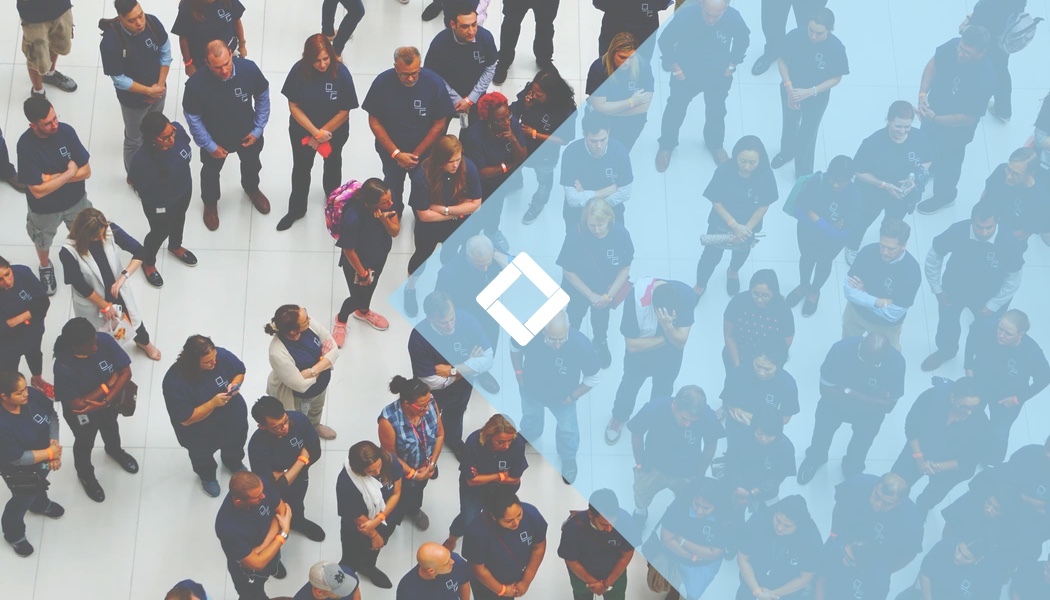
Since the dawn of time, humans are programmed to conform. Social Proof is embedded deep into our evolutionary code.
Aristotle said, “man is by nature social”. Today, it seems we’ve proved him right, from Cialdini to social media.
Human beings like to conform. We look to others to determine the correct way in which to behave. We compare constantly. Are influenced by the majority.
Our Instagram following thrives. We follow TikTok trends. Take our peers' advice very, very seriously.
Yes, it means we get frustrated when our step counter isn’t as high as our friends’. It also means we’ll get a subconscious urge to look up when a crowd is looking up, sometimes for no reason at all.
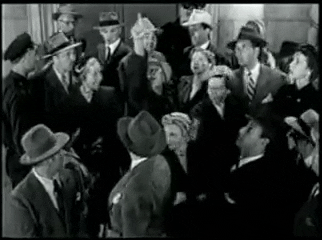
Restaurants with big lines? A good thing. A company with lots of praise? A great thing. A T-shirt that’s a “Bestseller”?
I’ll take it!
Social Proof is the foundation of how we behave in relation to others. Innately, human beings survive in tribes, communities, and by following the ‘in-group’.
So what is this psychological principle? Why is it the most robust psychological tool in a marketer’s handbook? And how do we use Social Proof examples to explain subconscious behavior?
As consumer psychologists, we wanted to answer these questions once and for all. As one of the most powerful psychological principles out there, here are examples of Social Proof through the lens of psychologists.
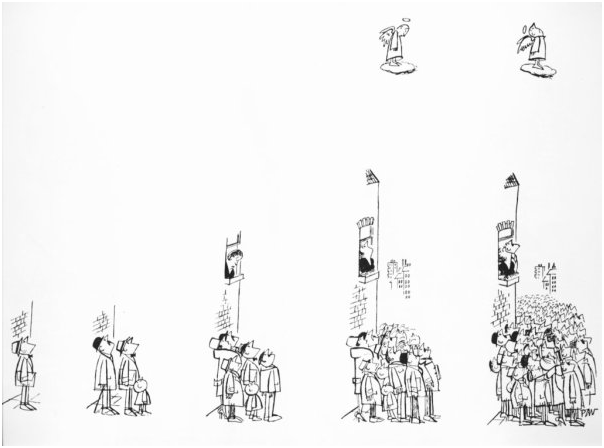
Source: SMF
Social Proof is the psychological principle that explains when people look to others to determine the correct way in which to behave. According to CXL, Social Proof is the “normative social influence” that people adopt.
Buffer suggests that Social Proof is when people assume the actions of others, and Sprout social supports this but says it’s when people follow the actions of others. All these definitions are true. But they lack one very important clause that gives Social Proof its meaning:
People look to others when they are unsure of the correct way to behave.
This is very important.
It means this psychological principle will only work if an individual is feeling indecisive, unsure, or hesitant.
Popularized by Robert Cialdini in his 1984 book Influence, Social Proof is one of six principles of persuasion. Like Commitment & Consistency, Liking & Consensus, Scarcity, Reciprocity, and Authority, Social Proof (i.e., Conformity) occurs at moments of uncertainty.
Meaning, when in doubt,
“We are willing to place an enormous amount of trust in the collective knowledge of the crowd...Social Proof is most powerful for those who feel unfamiliar or unsure in a specific situation and who, consequently, must look outside themselves for evidence of how best to behave.” - Robert Cialdini, Influence
I don’t have to tell you how rampant decision stress and Choice Overload are. Whether you’re famously indecisive like I am, or whether you think you’re in total control.
The “elevator experiment” had a group of people facing the rear of the elevator. Even if the test subjects knew the doors opened at the front, many turned to the rear to copy the behavior of the crowd.
In fact, the more “in control” of your choices, the more likely it is that your brain is leveraging subconscious biases to shortcut decision-making. It may seem like the faster you decide, the more reasonable your decision is.
However, your brain is actually being influenced by certain cognitive biases that live in the “irrational”, or reactive, brain.
You’re not as in control as you might think.
In Kahneman’s work Thinking, Fast and Slow, he describes these two sides of the brain (the reflective and irrational) as Systems 1 and 2.
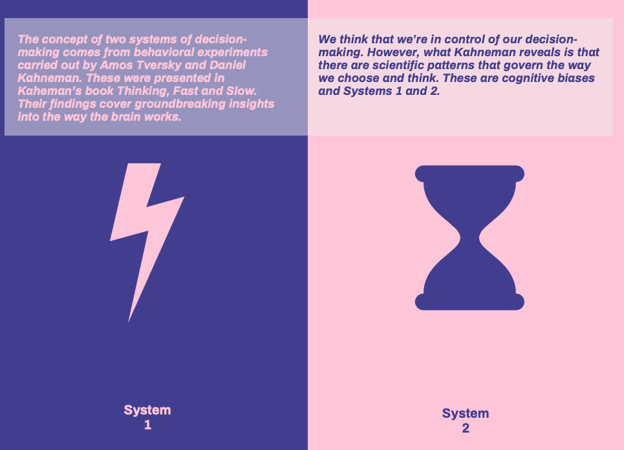
Read Kahneman’s work for more.
System 1 leverages cognitive biases as shortcuts (called heuristics) to make decisions: The brain connects perception to previous knowledge. This works within seconds so that we don’t over-rationalize every single choice we make.
For example, we instinctively go to the bathroom marked with our gender, right?
We don’t scratch our heads wondering why there are stick figures on the front of the door and what they mean. Here, our brain is using System 1 to help us behave in the best and/or most correct way.
Social Proof falls under the realm of heuristics. We use the Social Proof bias to help us act fast, jump to conclusions, and make assumptions.
Let’s have a look at some types of Social Proof biases.

In the 16th century, groups of professional applauders were hired for theatres and operas. Known as “Claquers”, they would initiate clapping and everyone would copy them. This would prime the idea that the show was popular and people were enjoying themselves.
Have you ever started applause yourself? Or a Mexican wave?
When there’s a crowd, gathering, or simply lots of people, people are more prone to Social Proof. This is part of a cognitive bias called the Bandwagon Effect. It basically suggests that people will adopt certain behaviors, opinions, or beliefs if the majority is doing it.
So while clapping may seem minor, imagine you believe in free healthcare, animal rights, or overthrowing a dictator. An idea can propagate a movement if you have the right kind of crowds and Social Proof behind it.

The #blackouttuesday to support the BLM movement
But aside from ideology or protest, here are other familiar areas you’ll see the Bandwagon Effect at work in the irrational brain:
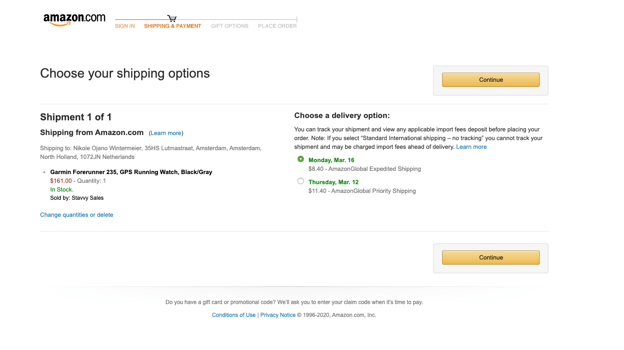
Amazon’s default shipping option
On the other hand, where an idea with the right backing can charge up the masses, so can the idea of inaction. People like things to remain the same. We fall into habit, repeat behaviors, and make choices that don’t require too much cognitive effort.
The social default bias means individuals will resort to the behavior of the default (in this case, what the crowd is doing) instead of inciting change.
For example, how many times have you customized your cookie settings on Google?
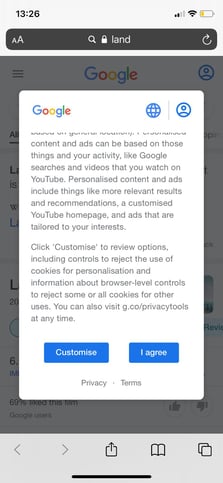
I don’t know about you, but my go-to is always to “I agree” because, otherwise, I’d have to read more information and choose boxes. Changing the status quo means action, and my brain is too lazy for that.
In social settings, people will stick to the behavior of the group or majority rather than affect change. Human beings are programmed to conform rather than lose out as individuals. There’s more of a risk to ‘go it alone’. Often, the default behavior in these instances is implied.
For example, standing in line to get a movie ticket rather than crowding the ticket corner in a disorderly fashion. Or, letting people out of a train before getting on yourself.
Again, these are deep-seated social behaviors: If people don’t follow them, it can cause quite the shock.
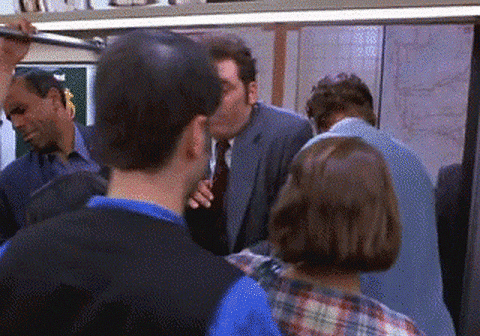
More examples of the Social Default Bias are things like:

“Tank Man” in Tianmen
And some examples of countering the Social Default Bias (going against the status quo) that you just might recognize:
From these examples, you could say the opposite of Social Proof is non-conformity. But that’s for another article.

In Nepal and India, people don’t wait for others to disembark a train. The normative behavior here is to pile in as much as possible. We’ll talk about cross-cultural norms a bit later.
Ultimately, you can always tell what has a socially approved stamp by seeing the behavior of the herd. This is another Social Proof bias called Herd Behavior. Which is more in line with how people make decisions as a group rather than as individuals.
Our in-house psychologists unpack the idea of this Social Proof bias by looking at evolution. Here’s what they had to say:
Patrick (Consumer Psychologist at Crobox): Social Proof is so effective because it dates back to evolution. As a caveman, if you see someone running away from something, you’ll run too right?
Joris Fonteijn (Chief Behavioral Officer at Crobox): Definitely. Throughout evolution, Social Proof increased your chances of survival. If you didn’t carry out the same behavior as your herd, you could die.
Patrick: Or get eaten.
Joris: Exactly. Now, however, Social Proof means belonging to an ‘in-group’ and that determines your so-called survival. If you don’t conform, you get left out. Since human beings are social beings, being “left out” could cause mental health issues, or the inability to adapt, which all are part of our growth makeup.
Patrick: Or you run the risk of failure. Take restaurant lines. This is a type of Social Proof because it shows the restaurant is good if it attracts a lot of people. If you go to an empty restaurant, it’s risky because the food might be bad. So if you don’t conform, you run the risk of failing in your endeavor or choice.
Joris: That reminds me of the BBC experiment in the waiting room. They had a group of people and one ‘test’ subject. Every time a bell rang, the group would stand up. Eventually, what do you think the one person sitting did, even if deep down they knew it was strange, irrational, and unnecessary?
Watch this video on BBC to find out what Joris means:
In short, Herd Behavior is a bias that is so ingrained into our evolutionary code! Which is why Social Proof is part of System 1 thinking. It’s instinctive and effective.
Here are more types of Herd Behavior you might recognize:
These examples of Social Proof go from evolution to every day. In psychology, this is what makes Social Proof so effective.
Let’s break it down.

“On Wednesdays we wear pink.” Without question, new girl Lindsay Lohan wears pink too to fit in with the cool girls. And to exploit and destroy them from the inside.
But that’s beside the point.
Social identity theory states that people define who they are in reference to the group they belong to.
People want to copy the habits and behaviors of these ‘in-groups’ in order to establish their identity. It’s part of another psychological tendency called groupthink: Where, sometimes, people set aside their own beliefs to adopt the belief of the group.
Groupthink can be a pitfall of Herd Behavior causing social issues like peer pressure, self-censorship, and stereotyping. However, in the long run, the need to fit in is just another principle in the survival toolkit.
In a 1984 study, for example, peer-based Social Proof was the most effective strategy to help adolescents quit smoking.
“Conformity has its roots in primal behavior. Without it, animals wouldn’t survive in the wild, where everything can kill you if you’re a ‘lone wolf’” - Joris, CBO at Crobox
In the end, it depends on who the ‘in-group’ is to determine what kind of behavior to carry out. That’s where “normative behavioral” cues come into play.
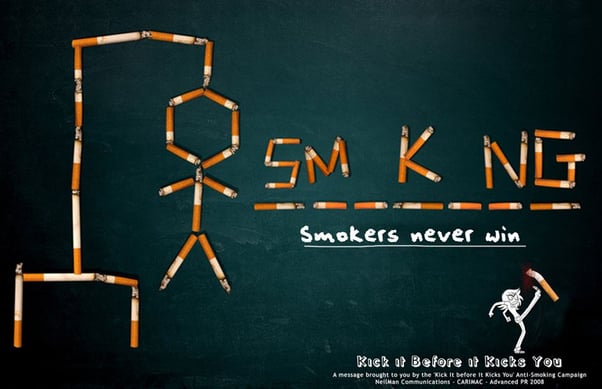
The ad implies that smoking = losers, which is an injunctive norm. Alternatively, statistics correlating cancer with smoking would qualify as a descriptive norm.
We don’t litter because it’s bad for the environment. We try not to smoke because it’s bad for our health. We are encouraged to donate to charities if our peers are doing the same.
There is an element to social responsibility that is deemed ‘normative’. Norms can be either descriptive (when you see the behavior of others) to injunctive (when you assume the behavior of others).
For example, a descriptive norm is standing in one direction in an elevator because the majority are doing the same, even though you are 99% sure that the door opens the other way.
Injunctive norms, on the other hand, are things like:
Both areas of normative behavior are Social Proof examples. They take behaviors, actions, or attitudes that have been tried and tested by a group of people to then replicate these behaviors.
Of course, these norms will differ depending on geography or time period -
Smoking was cool back in the ‘50s. We give three kisses on the cheek in Switzerland instead of two (in France the social norm is three and, yes, this does cause a lot of awkwardness).
It’s also why we may whisper in a library but shout at a bar. Normative behavior is conditioned by the most popular group we identify with.
Therefore, these are “norms associated with the particular environment, situation, or circumstances that most closely match your own”(Caravan et al.).
Social norms determine our relationship with our environment, economies, and legal structures. You could say that determining normative behavior in relation to your closest group is what keeps the wheels of our society turning.
Which is pretty important, don’t you think?
“Social influence nudges take advantage of people’s desire to conform and comply with what is believed to be expected from them” - Caravan et al.

In an experiment by Gouveia et al., two questions were compared:
1. “If I have walked 4000 steps by noon, is this good enough? Am I likely to meet my daily goal?”
2. “Have I walked more than what I had done yesterday at the same time? Have I walked more than others having the same daily step goal?”
They found that for the Fitbit Flex, the second option was a better quantification for their target consumers.
Online, 93% of consumers say reviews impact their purchasing decisions. 83% read a review before purchasing an item online. That’s because we want to hear what our peers are saying about a product or service, to compare proof, and determine the correct way in which to behave.
Reviews are so powerful, it’s one of the best examples of Social Proof in eCommerce. I’ll talk you through this example later on.
In Influence, Cialdini writes about a famous experiment in hotels. In order to nudge the behavior of reusing towels, two messages were explored:
Can you guess what happened?
People who learned that the majority of other guests reused their towels (the second message) were 26% more likely to recycle their towels than those who saw the first message.
Since this example of Social Proof was never-before-seen in hotels, Cialdini actually noted a 26% increase in participation relative to the industry standards.
All by changing the message to include a Social Proof bias.
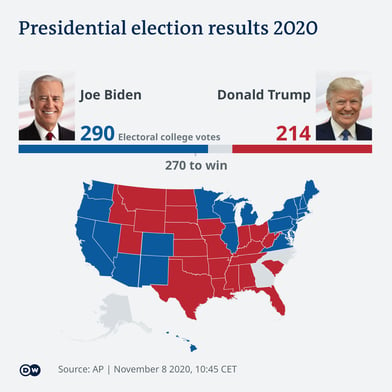
In a 2008 study, Salganik created a fake music sharing platform with built-in popularity rankings. He found that when he inflated the rankings of the least popular songs, they actually gained popularity.
People thought that others were ranking the songs highly and so Social Proof primed them to rank them high as well. No wonder some artists continuously hit #1 on the charts.
Indeed, the majority rules. It’s the basis of our democratic elections. It’s how we make executive decisions. It’s why influencers are so popular. If the majority gets behind it, there is an element of proof, trustworthiness, and credibility.
Of course, majority rules messages should be framed as positive like “Join us” versus “Be a sheep”.
For example, Hubspot tests all kinds of dynamic notifications that use Social Proof messaging. They want to see which version generates the most clicks and sign-ups.
The notification below, “Join 64,500+” is usually the message I see the most.

If you’re leveraging Social Proof in marketing, it’s also important to remember to define a majority who is similar to your target audience. For Hubspot, “Customer-Facing Professionals” is the majority or ‘in-group’.
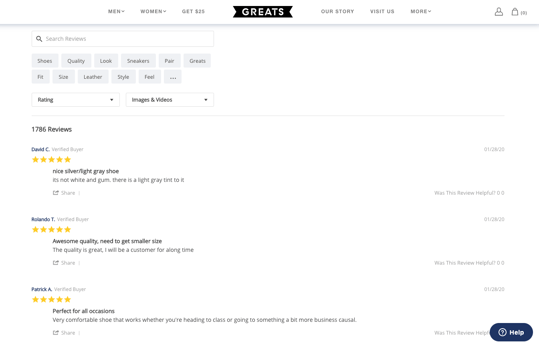
According to the psychological principle of the Multiple Source Effect, the more virtual speakers you have, the more persuasive your offering.
For example, reviews help guide decision-making. Especially in eCommerce, user-generated reviews and/or rankings on the product detail page will provide multiple voices.
In this phase of the customer journey, reviews are a great nudge that give information to guide the user through to checkout.
This Social Proof example leverages both social norms and the comparison effect. Webshops that use star ratings will appeal to the System 1 brain: The more stars the quicker the brain recognizes endorsements.
Individuals need reassurance, and this usually comes from their peers. Even bad reviews will help support the overall positive impression of the product or service, which is called The Blemishing Effect.
When it comes to Social Proof, you really can’t go wrong with reviews and ratings.
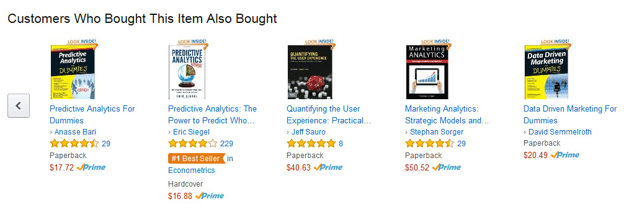
Another powerful Social Proof effect that’s easy to apply is the idea of similarity.
If you can prime the idea that someone is similar to you, you can influence similar behavior.
In a 2005 experiment that studied the effect of laughter tracks, researchers found that people were more likely to enjoy a clip when they believed it was taken from an audience they identified with.
Amazon, for example, uses a recommendation engine that shows customers who have bought the product have also bought… Which is a good way to foster similarity. Not to mention upsell in a personalized way.
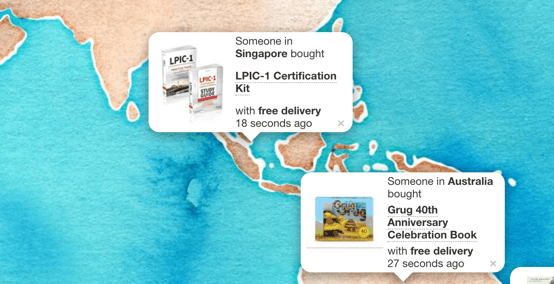
Book Depository has a map of countries to show people buying books around the world. The shoppers have an idea of similar books people buy, and the website is also able to foster a sense of global community.
Queues, restaurant lines, crowds...like we’ve already explored above, the more people the better the Social Proof.
But that doesn’t mean you should go out right now and gather a crowd (although some club owners do that to increase the appeal of the venue).
There are certain nudges you can leverage that will imply the force of a crowd. For example, this Elvis Presley album leverages Social Proof by showing how many fans love the album.
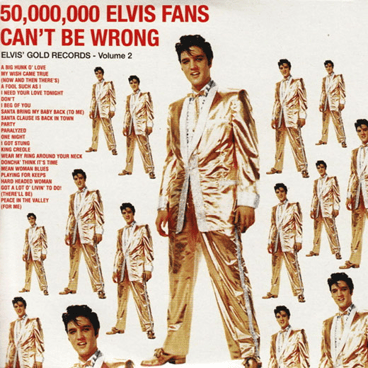
Crobox’s psychologists discuss this theory:
Patrick: Queues in front of a shop are really triggering, especially if it’s a familiar shop. I want to know the reason people are standing in line - it must be something worth the wait, right? If you’re going out of your way to stay in a line (especially outside) this shows that the effort matches the reward.
Joris: This effect is all too powerful and I’ve always wanted to recreate this online. Like how in churches there’s always an emblem or statue piece that’s worn down because people rub it for good luck. If we could somehow show this online by having a worn-down button, for example, it would drive behavior by priming the idea that many have carried out similar behavior.
Patrick: Take COVID-19 vaccinations. A lot of people are against them because many people aren’t being vaccinated. But the more crowds buy into vaccination, the more others will follow suit. This is how Social Proof underlines pandemic behavior. Like wearing a mask in public. In Amsterdam, people only really started to do it after seeing others wearing masks. It wasn’t enforced, so people relied on copying the behavior of others.
Joris: Exactly. The Dutch government primed the willingness to get vaccinations by collecting a survey of how many people wanted to be vaccinated which they delivered as an ad. It said something like 75%-80% of Dutch people want to be vaccinated. If you see a majority doing it, this has the effect of proof and credibility which primes similar behavior. But of course, you should be careful how you use this. You shouldn’t say “X amount of people don’t throw their cigarette butts away!” because this kind of negative Social Proof will backfire.
Source: Yieldify 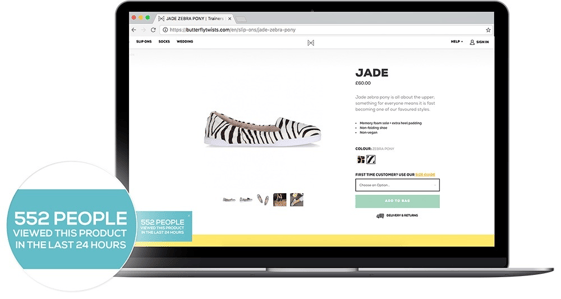
Showing the “queue effect” online is really simple. You can use dynamic notifications like Yieldify leverages above or product badges (e.g., showing “Bestseller” or “Popular”). There are lots of Social Proof tools you can use on your webshop.
To learn more ways Social Proof messaging can be effective online, get in touch with Crobox’s experts!
This article has shown why Social Proof is so effective;
And, most notable for you to remember, Social Proof is easy to apply. As one of the most robust psychological principles in Cialdini’s repertoire, it’s no wonder it’s every marketer’s go-to.
Hopefully, you have a better idea of Social Proof examples in psychology. From Social Proof biases to applying them online, this psychological principle can help you understand why people behave the way they do.